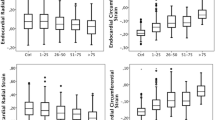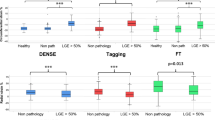Abstract
To determine the diagnostic performance and reproducibility of strain assessment with displacement encoding with stimulated echoes (DENSE) cardiovascular magnetic resonance (CMR) in identifying contractile abnormalities in myocardial segments with late gadolinium enhancement (LGE). DENSE CMR was obtained on short-axis planes of the left ventricle (LV) in 24 patients with suspected coronary artery disease. e1 and e2 strains of LV wall were quantified. Cine MRI was acquired to determine percent systolic wall thickening (%SWT), followed by (LGE) CMR. The diagnostic performance of e1, e2 and %SWT for predicting the presence of LGE was evaluated by receiver operating characteristics (ROC) analysis. Myocardial scar on LGE CMR was observed in 91 (24 %) of 384 segments. The area under ROC curve for predicting the segments with LGE was 0.874 by e1, 0.916 by e2 and 0.828 by %SWT (p = 0.001 between e2 and %SWT). Excellent inter-observer reproducibility was found for strain [Intraclass correlation coefficient (ICC) = 0.962 for e1, 0.955 for e2] as compared with %SWT (ICC = 0.790). DENSE CMR can be performed as a part of routine CMR study and allows for quantification of myocardial strain with high inter-observer reproducibility. Myocardial strain, especially e2 is useful in detecting altered abnormal systolic contraction in the segments with myocardial scar.





Similar content being viewed by others
References
Lieberman AN, Weiss JL, Jugdutt BI, Becker LC, Bulkley BH, Garrison JG, Hutchins GM, Kallman CA, Weisfeldt ML (1981) Two-dimensional echocardiography and infarct size: relationship of regional wall motion and thickening to the extent of myocardial infarction in the dog. Circulation 63:739–746
Gibbons RJ, Valeti US, Araoz PA, Jaffe AS (2004) The quantification of infarct size. J Am Coll Cardiol 44:1533–1542
Sanz G, Castaner A, Betriu A, Magrina J, Roig E, Coll S, Pare JC, Navarro-Lopez F (1982) Determinants of prognosis in survivors of myocardial infarction: a prospective clinical angiographic study. N Engl J Med 306:1065–1070
Schulman SP, Achuff SC, Griffith LS, Humphries JO, Taylor GJ, Mellits ED, Kennedy M, Baumgartner R, Weisfeldt ML, Baughman KL (1988) Prognostic cardiac catheterization variables in survivors of acute myocardial infarction: a 5 year prospective study. J Am Coll Cardiol 11:1164–1172
Holman BL, Goldhaber SZ, Kirsch CM, Polak JF, Friedman BJ, English RJ, Wynne J (1982) Measurement of infarct size using single photon emission computed tomography and technetium-99 m pyrophosphate: a description of the method and comparison with patient prognosis. Am J Cardiol 50:503–511
Weiss JL, Marino PN, Shapiro EP (1991) Myocardial infarct expansion: recognition, significance and pathology. Am J Cardiol 68:35D–40D
Holman ER, Buller VG, de Roos A, van der Geest RJ, Baur LH, van der Laarse A, Bruschke AV, Reiber JH, van der Wall EE (1997) Detection and quantification of dysfunctional myocardium by magnetic resonance imaging. A new three-dimensional method for quantitative wall-thickening analysis. Circulation 95:924–931
Holman ER, Vliegen HW, van der Geest RJ, Reiber JH, van Dijkman PR, van der Laarse A, de Roos A, van der Wall EE (1995) Quantitative analysis of regional left ventricular function after myocardial infarction in the pig assessed with cine magnetic resonance imaging. Magn Reson Med 34:161–169
Gotte MJ, van Rossum AC, Twisk JWR, Kuijer JPA, Marcus JT, Visser CA (2001) Quantification of regional contractile function after infarction: strain analysis superior to wall thickening analysis in discriminating infarct from remote myocardium. J Am Coll Cardiol 37:808–817
Garot J, Bluemke DA, Osman NF, Rochitte CE, McVeigh ER, Zerhouni EA, Prince JL, Lima JA (2000) Fast determination of regional myocardial strain fields from tagged cardiac images using harmonic phase MRI. Circulation 101:981–988
Aletras AH, Balaban RS, Wen H (1999) High-resolution strain analysis of the human heart with fast-DENSE. J Magn Reson 140:41–57
Aletras AH, Ding S, Balaban RS, Wen H (1999) DENSE: displacement encoding with stimulated echoes in cardiac functional MRI. J Magn Reson 137:247–252
Aletras AH, Wen H (2001) Mixed echo train acquisition displacement encoding with stimulated echoes: an optimized DENSE method for in vivo functional imaging of the human heart. Magn Reson Med 46:523–534
Sigfridsson A, Haraldsson H, Ebbers T, Knutsson H, Sakuma H (2010) Single-breath-hold multiple-slice DENSE MRI. Magn Reson Med 63:1411–1414
Cerqueira MD, Weissman NJ, Dilsizian V, Jacobs AK, Kaul S, Laskey WK, Pennell DJ, Rumberger JA, Ryan T, Verani MS; American Heart Association Writing Group on Myocardial Segmentation and Registration for Cardiac Imaging (2002) Standardized myocardial segmentation and nomenclature for tomographic imaging of the heart. A statement for healthcare professionals from the Cardiac Imaging Committee of the Council on Clinical Cardiology of the American Heart Association. Circulation 105:539-542
Wu E, Judd RM, Vargas JD, Klocke FJ, Bonow RO, Kim RJ (2001) Visualisation of presence, location, and transmural extent of healed Q-wave and non-Q-wave myocardial infarction. Lancet 357:21–28
DeLong ER, DeLong DM, Clarke-Pearson DL (1988) Comparing the areas under two or more correlated receiver operating characteristic curves: a nonparametric approach. Biometrics 44:837–845
el Ibrahim SH (2011) Myocardial tagging by cardiovascular magnetic resonance: evolution of techniques–pulse sequences, analysis algorithms, and applications. J Cardiovasc Magn Reson 13:36
Schuster A, Kutty S, Padiyath A, Parish V, Gribben P, Danford DA, Makowski MR, Bigalke B, Beerbaum P, Nagel E (2011) Cardiovascular magnetic resonance myocardial feature tracking detects quantitative wall motion during dobutamine stress. J Cardiovasc Magn Reson 13:58
Morton G, Schuster A, Jogiya R, Kutty S, Beerbaum P, Nagel E (2012) Inter-study reproducibility of cardiovascular magnetic resonance myocardial feature tracking. J Cardiovasc Magn Reson 14:43
Zerhouni EA, Parish DM, Rogers WJ, Yang A, Shapiro EP (1988) Human heart: tagging with MR imaging–a method for noninvasive assessment of myocardial motion. Radiology 169:59–63
Axel L, Dougherty L (1989) MR imaging of motion with spatial modulation of magnetization. Radiology 171:841–845
Osman NF, Sampath S, Atalar E, Prince JL (2001) Imaging longitudinal cardiac strain on short-axis images using strain-encoded MRI. Magn Reson Med 46:324–334
Sigfridsson A, Haraldsson H, Ebbers T, Knutsson H, Sakuma H (2011) In vivo SNR in DENSE MRI; temporal and regional effects of field strength, receiver coil sensitivity and flip angle strategies. Magn Reson Imaging 29:202–208
Croisille P, Moore CC, Judd RM, Lima JA, Arai M, McVeigh ER, Becker LC, Zerhouni EA (1999) Differentiation of viable and nonviable myocardium by the use of three-dimensional tagged MRI in 2-day-old reperfused canine infarcts. Circulation 99:284–291
Neizel M, Lossnitzer D, Korosoglou G, Schäufele T, Peykarjou H, Steen H, Ocklenburg C, Giannitsis E, Katus HA, Osman NF (2009) Strain-encoded MRI for evaluation of left ventricular function and transmurality in acute myocardial infarction. Circ Cardiovasc Imaging 2:116–122
Maret E, Todt T, Brudin L, Nylander E, Swahn E, Ohlsson JL, Engvall JE (2009) Functional measurement based on feature tracking of cine magnetic resonance images identify left ventricular segments with myocardial scar. Cardiovasc Ultrasound 7:53
Kramer CM, Rogers WJ, Theobald TM, Power TP, Petruolo S, Reichek N (1996) Remote noninfarcted region dysfunction soon after first anterior myocardial infarction A magnetic resonance tagging study. Circulation 94:660–666
Jeung MY, Germain P, Croisille P, El ghannudi S, Roy C, Gangi A (2012) Myocardial tagging with MR imaging: overview of normal and pathologic findings. Radiographics 32:1381–1398
Choi EY, Rosen BD, Fernandes VR, Yan RT, Yoneyama K, Donekal S, Opdahl A, Almeida AL, Wu CO, Gomes AS, Bluemke DA, Lima JA (2013) Prognostic value of myocardial circumferential strain for incident heart failure and cardiovascular events in asymptomatic individuals: the Multi-Ethnic Study of Atherosclerosis. Eur Heart J [Epub ahead of print]
Acknowledgments
This work was supported by JSPS KAKENHI Grant Number 23591762.
Conflict of interest
None
Author information
Authors and Affiliations
Corresponding author
Rights and permissions
About this article
Cite this article
Miyagi, H., Nagata, M., Kitagawa, K. et al. Quantitative assessment of myocardial strain with displacement encoding with stimulated echoes MRI in patients with coronary artery disease. Int J Cardiovasc Imaging 29, 1779–1786 (2013). https://doi.org/10.1007/s10554-013-0274-y
Received:
Accepted:
Published:
Issue Date:
DOI: https://doi.org/10.1007/s10554-013-0274-y




